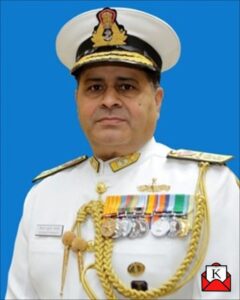Guest Blog: Sea Power Empowering Blue Economy


“Sea Power is a Country’s ability to use the Sea to National Advantage”- Alfred Mahan
Nearly 2/3rd of the world is covered by Oceans, wherein 70% of the humanity lives within 300 Kms of the Sea and 80% of world’s industrial activity is located in this region. Hence, power is pivoted on Ocean Littoral and thus, Littorals (a region lying along a shore) are vulnerable as well. Therefore, matters maritime shall always play an overreaching role. Nearly a century ago, Admiral S Gorshkov of Russian Navy (erstwhile USSR) had stated “Sea Power is the ability of the State to harness the wealth of the Oceans, status of its merchant and fishing fleets and their ability to meet the needs of the State and also the presence of the Navy matching the interests of the State”.
The Sea faring began 4½ thousand years ago. The Sea Power is an effective means of acquiring colonies, dominating trade and becoming self- prosperous.Even India was a very strong Maritime oriented Country during second millennium B.C. However, collateral advantage of Sea Power was unnoticed, when invading armies gained entry through North-West Land Front. Thus, India got paranoid with the land centric threats and started to neglect Sea Power. As a result of which, India got invadedby the Western Countries through the Sea Routes and we remained in Colonial Raj for Centuries.
Alfred T Mahan’s “The influence of Sea Power upon History 1660-1783” published in the year 1890, made United States of America to look Seawards and aroused interest in Britain, Germany, France and Japan to build a strong and credible Sea Power. A strong Maritime Nation acts as deterrence to other Maritime Nations.
Japan emerged as major Sea Power and defeated China in 1894 and defeated Russia in 1905. Till mid-20th Century, Chinese were victims, not the exponents, of Sea Power. Mao’s regime in 1950s gave a fillip to Sea Power and moved on from the Green Water Navy to the Blue water Navy.
India’s dominant physical features and geographical location in itself signifies the importance of Indian Ocean as well as dependence on Sea for both prosperity and security. Suffice to state that 1/4th of maritime trade and 1/5th of oil needsare driven from Indian Ocean. As also, 1/4th of the humanity and1/3rd of World Nationsare located in the Indian Ocean Region (IOR). Nearly 90% by volume and 80% of the world’s maritime oil trade passes through the IOR. Ocean-based trade currently contributes about 4 per cent of India’s Gross Domestic Product. Besides this, numerous unwarranted activities viz Piracy, Robbery & Theft at Sea, Drugs Smuggling, Gun Running and Human Trafficking are very much prevalent in the IOR. As also, Illegal Unreported & Unregulated Fishing in our Exclusive Economic Zone, which extends up to 200 nautical miles from our Coast Line (about 2.2 million square kms.) is prevalent in IOR(1 in 5 fish is sold illegally). All these nefarious activities have a big impact on the Blue Economy.
There are numerous Living & Non-Living Resources at Sea viz Fish & Marine Culture, Pearls & Sea Weeds, Coral Reefs, and Polymetallic Nodules that contain Nickel, Cobalt, Uranium, Magnesium, and vast Iron Ore deposits. Besides this, our Seas have renewable and non-renewable energy sources in plenty.
In view of the foregoing, India must have a very strong Maritime Power. As you know, the National Strategy is the Art and Science of developing and using the Political, Economic, Military, and Psychological Powers of the Nation to secure its National Assets. Hence, the Sea Power of any Country plays a pivotal role in protecting National Resources and contributes towards Blue Economy.
Sir Alfred Mahan had stated in 19thCentury – “Whoever controls the Indian Ocean will dominate Asia. This Ocean is the key to the seven seas. In the 21st Century the destiny of the World will be decided on its Waters”.
Realizing the true worth of Ocean Resources, even the Niti Aayog has set up a high-level panel for better coordination and integration of the Indian Government’s initiatives in the sphere of India’s Blue Economy. Blue Economy broadly refers to the use of Ocean Resources for Economic Growth, improved livelihoods, and jobs in a sustainable manner.
Accordingly, even the Indian Navy has outlined plans to quadruple India’s Blue Economy by the year 2050. India’s Sea Power is on steady progress through long-term indigenous shipbuilding programs in various Indian Ports viz. Mazagon Shipyard Limited (Mumbai), Hindustan Shipyard Limited (Vishakhapatnam), Goa Shipyard Limited (Goa), Cochin Shipyard Limited (Kochi), Garden Reach Shipyard Limited (Kolkata), Pipavav Shipyard (Gujarat) and many smaller shipyards. India should consolidate Maritime Power in the next 2 decades and have adequate Maritime Defence to protect National Interests. There is a need to enhance presence to underwrite regional stability and promote friendly ties with other littoral / non-littoral States in the IOR. We also need to enhance our presence and activities in the Exclusive Economic Zones to protect our living and non-living resources as well as renewable and non-renewable energy resources. India also needs to provide deterrence to nefarious activities such as Piracy, Robbery & Theft at Sea, Drugs Smuggling, Gun Running, and Human Trafficking which have a big impact on the Blue Economy.
About the author- Rear Admiral Kishan K Pandey (Retd.) is a Former Assistant Chief of Naval Staff & Flag Officer Fleet Review and Currently Working as a Director of HR at Amity University Haryana
